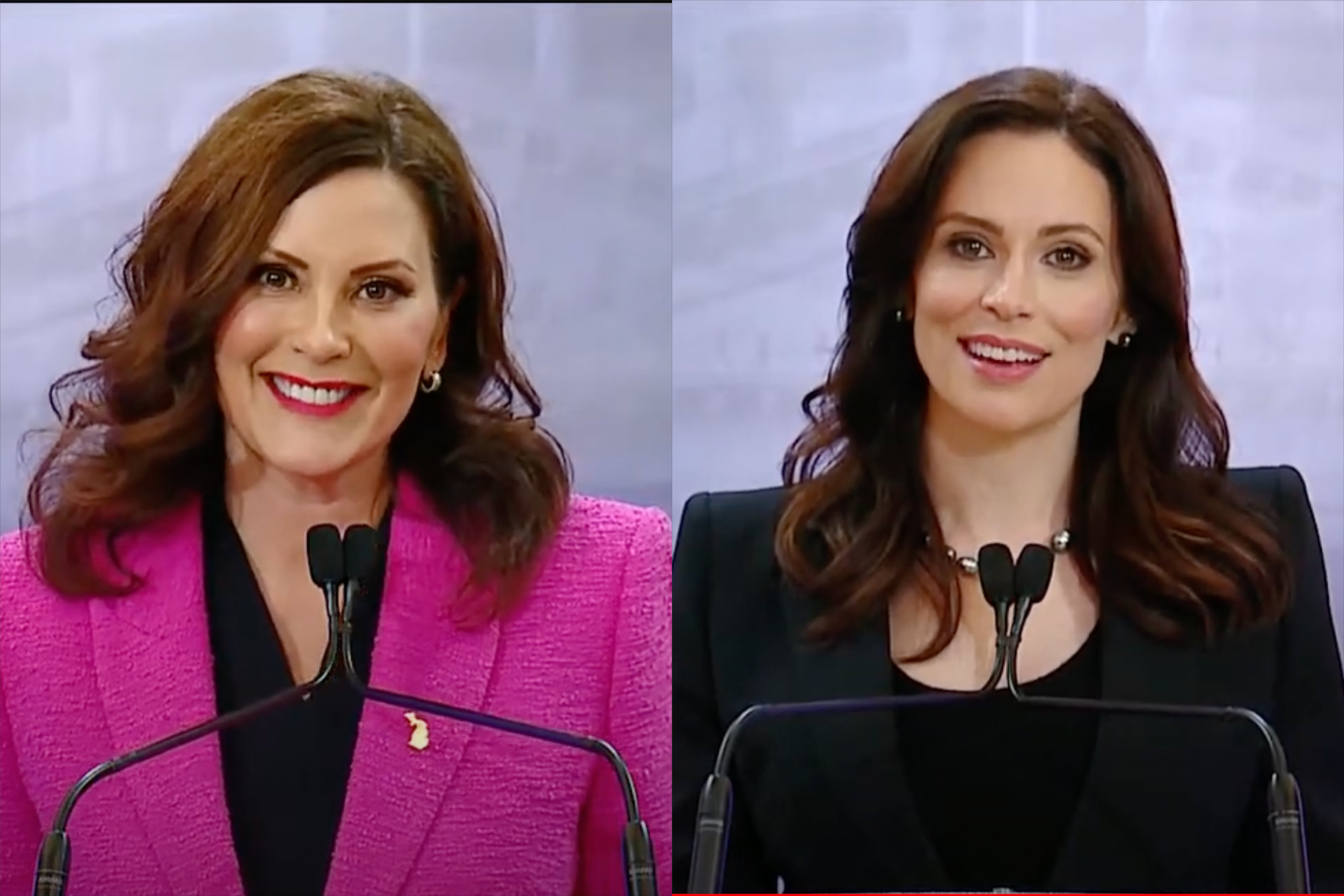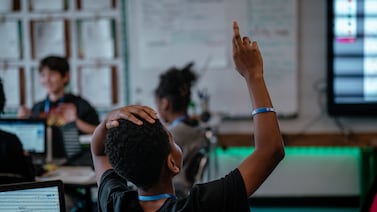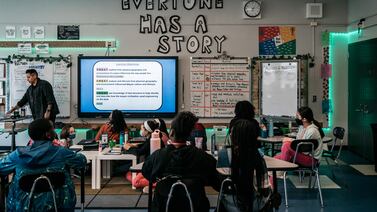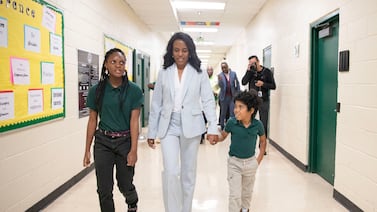Democratic Gov. Gretchen Whitmer says her challenger, Republican Tudor Dixon, downplayed the seriousness of children getting COVID and joked about guns around the time of the deadly Oxford school shooting.
Tudor says Whitmer kept children out of school longer than other governors and that Michigan children are failing in reading under her watch.
As Election Day approaches, Chalkbeat Detroit fact-checked these claims and others related to education. Here’s what we found:
Dixon’s claim: “The truth is (Whitmer) changed over to the Department of Health and Human Services and forced them to close down schools … She had all the power in the state to say no, we’re not going to have our schools shut down, we’re going to make sure that our students are back in person learning, just like other states.”
Dixon’s claim is misleading. Whitmer ordered classroom closures early in the pandemic, but the majority of remote learning was ordered by local school boards based on local COVID conditions, parent preferences, and other factors largely outside of Whitmer’s control.
In March 2020, state leaders across the country, including Whitmer, shuttered classrooms in response to COVID — a highly infectious, deadly illness without any treatments at the time. That summer, Whitmer struck a deal with Republican legislators to allow local school boards to choose between in-person and virtual learning in the fall.
In November 2020, the Department of Health and Human Services closed high schools statewide for about a month in response to a surge in new COVID cases, forcing districts to shift to remote instruction.
That was the last time school closures were required by Whitmer or the Department of Health and Human Services. In January of 2021, Whitmer called on districts to return to in-person learning by March.
Districts’ reopening timelines varied widely. Some kept classrooms open through much of 2020-21, while others — notably in urban areas — stuck with remote learning for the whole year or saw most parents opt for remote learning. School boards based their reopening decisions on parent preferences, local COVID conditions, and the stances of teachers unions, among other factors.
By May 2021, roughly half of Michigan students were learning fully in person, and most of the remainder were enrolled in a hybrid model that included some remote instruction. With the exception of a few remote days in some urban districts during COVID surges, the vast majority of Michigan students attended school fully in person throughout the 2021-22 school year.
Dixon has attacked Whitmer for saying that “kids were out for three months” on her watch. Many students learned remotely for much longer than that. Whitmer later said she was referring only to closures mandated by her administration, which did in fact last about three months.
Dixon’s claim: “What are you going to do to get these kids back on track? We got our reading scores back from the spring, nearly 60% of our third graders failed.”
Dixon ignores Whitmer’s record on education, but her reference to Michigan’s test results is roughly correct.
Students who take Michigan’s statewide exam are categorized as advanced, proficient, partially proficient, or not proficient. On state exams given in the spring, 58% of third graders were not deemed at least proficient.
With help from federal COVID funds, Whitmer signed a record school budget this year, including investments in mental health and teacher recruitment that will help students recover from the pandemic. While Whitmer’s administration was slow to prioritize tutoring as a learning recovery tool, she has since for a $280 million tutoring program.
Whitmer’s claim: “In the same month that the Oxford shooting happened (Dixon) posted a picture of herself with a gun with a caption saying, ‘Gun control means using both hands.’”
Dixon did post the photo and caption on Twitter, but the tweet appeared on Nov. 1, 2021, 29 days before the shooting at Oxford High School, where four students were killed, and six others and a teacher were injured.
Whitmer’s claim: Dixon is “bankrolled by Betsy DeVos. She has endorsed Betsy DeVos’s plan to drain half a billion from our public schools.”
Campaign finance reports show no direct contributions to Dixon’s campaign from Betsy DeVos, the former U.S. secretary of education, or her husband, former Amway CEO Dick DeVos.
But the pro-voucher DeVos family has contributed heavily to political action committees that support Dixon and her top education initiatives, making the DeVoses indirectly among her top financial supporters.
The DeVoses contributed $2.6 million to Michigan Families United, a super PAC that has spent most of the $7.6 million it raised on television commercials supporting Dixon.
The DeVos family also contributed $7.9 million to Let MI Kids Learn, the super PAC behind a voucher-like tax credit proposal that has been a centerpiece of Dixon’s education platform.
DeVos was the creator of that plan, which is structured to circumvent the state’s constitutional ban on using tax dollars to fund private schools.
Under the proposal, donors would get tax breaks equal to the amount of their scholarship donations. Private school families who meet income qualifications could receive up to $7,830 per child to offset tuition. Other families could receive up to $500 in scholarships for tutoring, books, speech therapy, or other help to supplement public school education.
The scholarships are estimated to cost $500 million a year in money that would otherwise be collected as tax revenue that goes toward state services including public safety, transportation, corrections, public schools, and health and human services.
It isn’t clear whether all of that $500 million would otherwise go into the school aid budget, but it is likely that public schools would be affected by decreased state revenue.
Whitmer’s claim: “Mrs. Dixon … said kids couldn’t get COVID.”
Dixon has repeatedly denied she said that, but her statements were captured on video.
On America’s Voice Live, a conservative talk show she hosted, Dixon downplayed the risks of children getting and spreading COVID.
On one 2020 episode, she said, “A lot of people would say that there is no evidence that shows that kids can transmit the virus, and so now they’re wondering, should kids have even been taken out of school because they’re not transmitting the virus.”
On another, she said that “this is not a virus that affects the young students.”
In fact, children are susceptible to COVID, although typically their symptoms are less severe. Nearly 14.9 million children are reported to have tested positive, according to the American Academy of Pediatrics. That’s 18.3% of all cases.
And researchers found that children can transmit COVID, more likely to adults than to other children.
Koby Levin is a reporter for Chalkbeat Detroit covering K-12 schools and early childhood education. Contact Koby at klevin@chalkbeat.org.
Tracie Mauriello covers statewide education policy for Bridge Michigan and Chalkbeat Detroit. Contact Tracie at tmauriello@chalkbeat.org.






